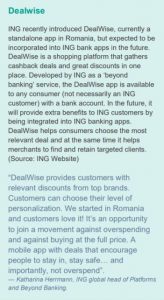Right before the Covid-19 crisis introduced itself to the world I was invited to talk about Protiviti’s knowledge on platforms in relation to Financial Services. How slowly but surely a new kind of platform is introducing itself into our markets. That meeting, one of the participants shared an interesting development and the manager of this particular platform agreed on an interview. But before sharing those insights with you, please follow me on short journey along where we came from and where we stand today looking at platforms in the Dutch market.
A little history on shopping online
The process of buying goods and services is steadily changing; how we buy our groceries and electronics, or book our holidays is a lot different from, let’s say, 15 years ago. For the Dutch market this change started with a company familiar to many of you —
In 1995, Wehkamp was the first consumer goods retailer with an online store on the, very recently introduced, internet. And as we know now, many were to follow. Back then, Wehkamp online was a “just” a digital copy of their bricks and mortar stores.
What is really interesting, is the evolution towards platforms that followed.
An example of a company that truly embodies the platform transition is BOL.com, an organization that went from selling books to allowing others to run their own product/business on their (highly optimized) infrastructure. This allows smaller business access to a multitude of market exposure and at the same time ensures clients receive the high service standards that BOL.com offers their own clients such as the return policy, ease of payment and the packaging and delivery conditions.
This growth in web shops inevitably meant the growth of another online service; payments. Imagine sending your cash by regular mail! The increase of online sales in the Dutch market can be measured by looking at the growth of online payments. Yearly growth percentages of 30% to 40% are common, not even taking the impact of Covid-19 into account, encouraging us to shop from the comfort of our homes.
While our traditional banks initially had a hard time keeping up with this new type of demand, new payment companies such as the Netherlands based Mollie and Adyen seized the opportunity of providing the much-needed infrastructure to process an online payment. The easier it becomes for a customer to initiate a payment online, the higher conversion rates are for platforms and their shops. This is something well understood by many web shops. It became a spiraling and exponentially fast development, with clients expecting increasingly faster responses and seamless integration of the entire process.
Where the supply chain meets financial services
With the technical innovations, our consumer behavior changed just as drastically. And with platforms maturing, this change continues and is on the verge of some major breakthroughs. The core enabler? Combining a sophisticated supply chain with integrated financial services and endless technological possibilities.
Until recently traditional banks had a near monopoly on consumer payment data related to their purchasing activities online. Where the web shop would only know this for their offered products, a bank would have insight in all the payment data of a specific customer, simply because it was holding the account used for the transfer of funds.
With the introduction of the 2nd Payment Service Directive (PSD2) by the European parliament, making it possible for third parties to access consumer payment data and process payments on their behalf (with their consent!), this monopoly came to an end. This means, having the applicable license of course, an online retailer or platform sells you something, processes your payment, and has insights into your product movement from A to Z. Potentially allowing them to play an increasingly bigger role in our personal financial forecasting and wellbeing than banks did up until now. Other forms of payments, such as converting money, or the monetary value, into specific platform credits.
What does this mean for traditional banks?
Don’t be fooled by the word traditional. Giants in the Dutch market such as ABNAMRO closely monitor the developments and have different innovation strategies, constantly re-evaluating their role and potential in this movement of “platformication”. Take Tikkie for example, an application developed by ABNAMRO enabling consumers to quickly create direct payment links and send them through social media. Splitting the restaurant bill was never this easy. The main game changer of this app was making its functionality available for all customers, not just those with an ABNAMRO bank account, giving the bank access to much more payment data. The bank then leveraged this data by using the Fintech called Tink, offering clients financial insights across the different banks. Determining their role in this process (are you an innovator, early adopter or lagging behind?) is a main item in the strategy of banks nowadays.
ING’s strategy
ING has a strategy of its own – not unlike that of a fintech or retail platform such as BOL.com. As part of this strategy, ING very recently announced the introduction of DealWise, a Romanian ING startup that aims to bring consumers and retailers together based on analyzing financial data.
I was lucky enough to get introduced to Katharina Herrmann the Global head of Platforms and Beyond Banking and was able to ask her some questions about their platform thinking and where ING stands at the moment. She told me that ‘beyond banking’ has much to do with ING’s purpose; empower people to stay ahead in life and business, for which making good financial decisions is crucial. This purpose, as Katharina explains, cannot be achieved by solely focusing on INGs own products and services. Broaden the scope and enter the idea of a platform where products and services can be offered that have a beneficial impact on financial decision making of individuals. In all the countries that ING operates in they see the same trend: consumers trying to get on top of their financial health and decision making but lacking true insight while at the same time overwhelmed by the sheer number of possibilities and products.
Financial health goes beyond pure financial products such as mortgages and investments and is about day-to-day spending. What do I actually spend my money on, what does my shopping behavior look like? And this is where it gets interesting for ING, as not only individuals are struggling with getting financial forecasting and insight into financial data right.
“Look at the speed at which business is conducted these days, live, updated by the second. Cross account financial data can be a struggle. Especially when selling through different channels, using multiple payment providers and operating in many countries and time zones”.
Three pillars
This platform strategy, as Katharina explains, consists of three main pillars. First, the aim is the become a destination platform, the ‘go-to place’ for financial services and beyond, a place where consumers and producers interact. DealWise is a great example of this first pillar by helping clients get the most relevant deals.
Another pillar is through connecting to existing platforms. Because of the move towards platforms as described in the beginning of this article, it is important for banks such as ING to move to where their customers are. On these platforms ING can offer their capabilities as a service or become a producer on a third-party platform.
Additional to these two pillars, it is important for ING to invest in independent initiatives. Examples include Yolt, Cobase and Payconiq. These companies are not ING branded and aim to fulfill the common need for platforms in their own way.
ING’s ambition is to help all their customers, from individuals through retail to large corporates, making better and faster decisions based on (financial) information. And doing so in a safe, convenient and easy way. It helps that ING overall receives high trust from their clients internationally, as well as a high Net Promoter Score (NPS). This trust is crucial for clients to be willing to share access to their data in order for ING to offer help making better decisions. Consumer consent is key here. But with their consent and access to their data, it is amazing to see how much can be learned about our behavior, habits and overall lifestyle by analyzing financial patterns. It is closer than many people in your life will ever get to you.
The competition
This brings me to asking Katharina how she sees her competition; why would ING succeed in a market where players like Coolblue, BOL.com and Amazon are dominating? Katharina explains that their position as a large, well-known and trusted organization plays an important role. ING stands at the crib of other FinTech firms that work with gathering data. For example, Cobase a PSD2 License for corporate clients and Yolt for retail clients.
Both companies feature platforms that enable their clients to connect multiple bank accounts and provide their users with easy grip on all their financial matters, enabling better financial decisions with easy to use actionable insights.
Besides their name, reach, and the trust of their customers, ING uses affiliate networks to analyze platform movement, as well as a strong wholesale network that will be used to populate the supply side of the platform. Their reputation can also be a risk – misuse of the platform and damaging the good faith can be extra harmful. ING is very aware of that risk and needs to adjust their traditional way of looking at (banking) risks to be ahead of these developments. Running a platform demands a different mindset. To live up to ING standards reputation of participants, as well as behavior on the platform, will be closely monitored. ING has big ambition with DealWise, that will start with food products but hopes to develop into a broadly oriented retail platform.
What will the future hold
What ING is trying to do by developing their strategy around platforms marks a new era of development within financial technology – the seamless integration with our lives, knowing us better than we do ourselves. Enabling us to make decisions for the better. PSD2 as regulation is a big enabler in this field but the true development will come from platforms like DealWise, but there are many more such as Uber and Amazon, to name a few of the big players around. All working on the integration of payment services with their offerings and the possibilities that this will bring. It will no longer be the case of talking about ‘a financial institution’ or ‘a retailer’, as the integration of services will dilute these concepts as we know them today.
It is an interesting journey to follow, both as a professional and as an individual. If this information means so much, are we really still in control about our own data, and do we really make our own decisions? Or is that stadium long gone, and if so, what does that mean? Are we ok with sharing our financial decisions, Google might understand where we have our interest in, our payment data shows our true financial behavior! At Protiviti we monitor these developments up close. It will take a new perspective on the ‘old ways’ to adapt. What does risk management beyond banking look like? Where is the consumer in all this? How can you stay compliant as well as be innovative enough to keep up with the developments? There is no one-off, no simple answer but we invite you to embark on this journey with us as this is a first discovery we made and more will follow when we take off into the future.
Authors: Owen Strijland and Eva Noordhoek, Protiviti, FinTech Financial Services
Read the original article here. Find out more about Protiviti here.


